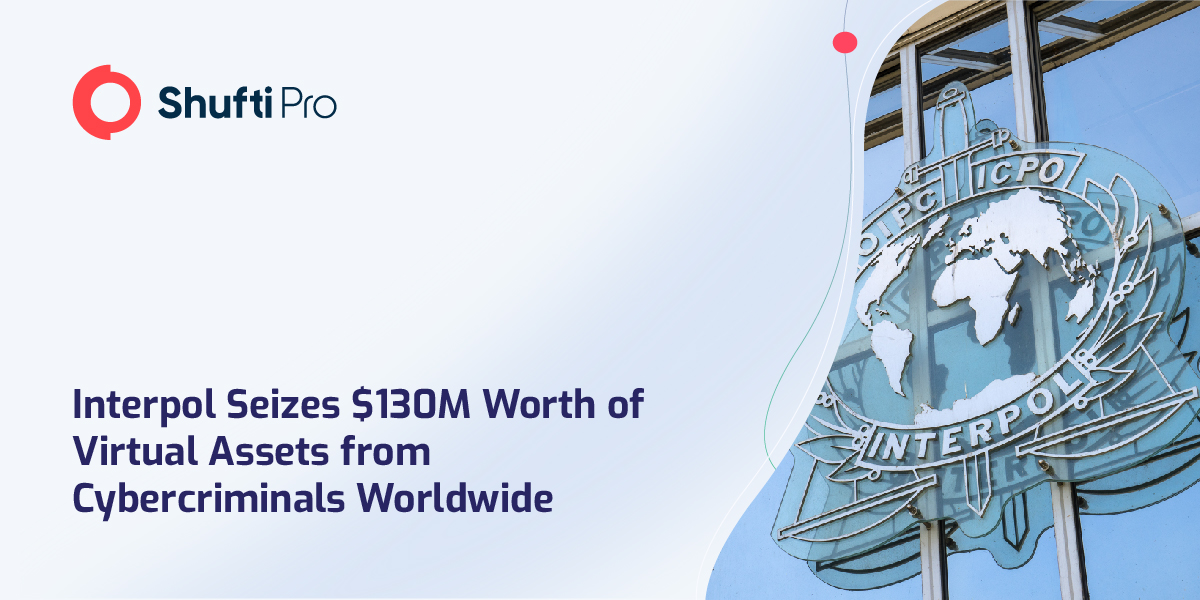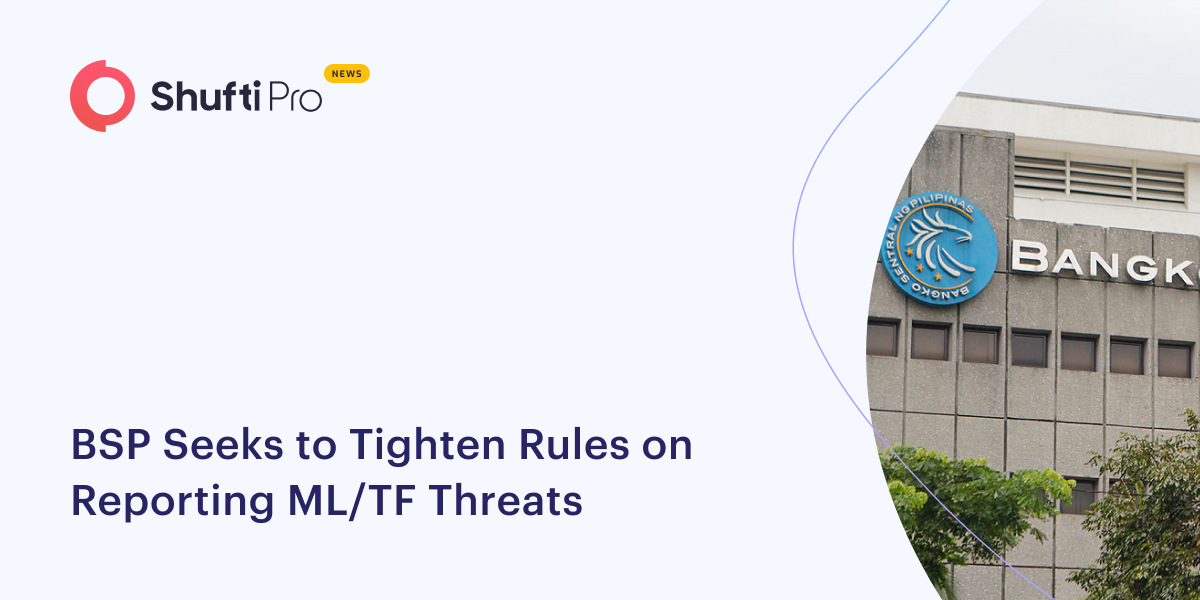News
UAE central bank alerts about fraud attempts related to Coronavirus epidemic
Bank customers are warned of potential fraud by the UAE Central Bank. According to the bank, “Fra...
 Explore More
Explore More
News
SPP Observes Rapid Increase in Money Laundering Cases Prosecuted Nationwide
The Supreme People’s Procuratorate (SPP) has observed a rapid increase in money laundering ...
 Explore More
Explore More
News
Congress to Pass Urgently Needed AML & Whistleblower Protections Against Russian Oligarchs
Congress is close to passing urgently required AML and whistleblower protections targeting Russia...
 Explore More
Explore More
News
Pakistan Launches Contactless Biometric Verification for Banking
Pakistan has become one of the first countries in the world to implement biometric verification t...
 Explore More
Explore More
News
U.S. Treasury Identifies Emerging Money Laundering Risks and Vulnerabilities
The US Department of the Treasury recently issued its National Risk Assessment for Money Launderi...
 Explore More
Explore More
News
Clearview AI will be facing the legal claims after critical NYT report
Clearview AI is an artificial intelligence firm providing facial recognition technology to US law...
 Explore More
Explore More
News
Turkey at Risk of Becoming a Haven for Russian Sanctions
Turkey is facing rising pressure for compliance with sanctions imposed on Russia and to increase ...
 Explore More
Explore More
News
FCA Cracks Down on Various Operators Hosting Illegal Crypto Cash Machines Around Leed
The FCA (Financial Conduct Authority) suspects many sites around Leeds of hosting illegally opera...
 Explore More
Explore More
News
Dutch Court Rules Out Duties Imposed by National Bank on Crypto Platforms
The Dutch District Court ruled out all National Bank’s duties on the crypto platforms by stating ...
 Explore More
Explore More
News
Former US Bank Risk Officer fined for AML oversight
Michael LaFontaine, former chief risk officer at U.S. Bank has been imposed a fine of $450,000 by...
 Explore More
Explore More
News
US Officials Visit Iraq to Lessen Currency Crisis, Says Central Bank Governor
Iraq’s currency may get uplifted after the meeting between the US top treasury officer and the he...
 Explore More
Explore More
News
MONEYVAL Urges Poland to Improve its AML/CFT Regulatory Framework
MONEYVAL has called upon Polish authorities to improve their regulatory framework and work on str...
 Explore More
Explore More
News
More than HK$8 Billion has been Laundered through Hong Kong Banks in 2020
Victims of online, phone and investment scams have been conned out of more than HK$8 billion (1.0...
 Explore More
Explore More
News
Bank of Ghana Issues New Guidelines for AML and CTF
The Bank of Ghana (BOG) has introduced new directives on Anti Money Laundering/Combating the Fina...
 Explore More
Explore More
News
Exchanges in Nigeria to Take Measures Against Crypto Scams
Nigerian cryptocurrency industry is to take strong measures to guarantee a safe trading environme...
 Explore More
Explore More
News
US Cybersecurity Head Fired by Trump for Discrediting the Voter Fraud.
Trump has fired the head of cybersecurity, Christopher Kerbs, for beinhg unloyal to the claims of...
 Explore More
Explore More
News
Foxconn Becomes the Victim of Ransomware Attack
A ransomware attack has impacted an electronic manufacturer, Foxconn, very badly. This attack was...
 Explore More
Explore More
News
Crypto Exchange Binance Banned by UK’s Financial Watchdog
Britain’s financial regulator, the FCA (Financial Conduct Authority) has said that Binance is no ...
 Explore More
Explore More
News
Google plans to conduct identity verification of advertisers
Google stated in a blog post on Thursday that it will soon require all advertisers to verify thei...
 Explore More
Explore More
News
Alibaba copyrights blockchain system that detects music copycats
Granted by the U.S. Patent and Trademark Office on April 21, the method as described by the Chine...
 Explore More
Explore More
News
NYDFS Reminds BitLicense Holders to Follow Rules
NYDFS (New York Department of Financial Service) has restated custody and disclosure requirements...
 Explore More
Explore More
News
EU Legislation Bans On-cash Deals Over €10,000 Due to Money Laundering Threats
The European Union’s ban on cash payments over €10,000 for transactions such as car payments is e...
 Explore More
Explore More
News
Australia, Singapore, Malaysia, and RSA Team Up for CBDC Trials
Central banking entities of Singapore, Australia, Malaysia, and South Africa agree on a mutual ag...
 Explore More
Explore More
News
Visa, Mastercard Face FTC Inquiry Over Debit Card Transactions
Visa Inc. and Mastercard Inc. are once again facing inquiries by the Federal Trade Commission ove...
 Explore More
Explore More
News
UK Regulatory Authorities Warns Crypto Firms to Comply with Latest AML Obligations
The UK regulatory department, Financial Conduct Authority (FCA), has warned cryptocurrency platfo...
 Explore More
Explore More
News
“Cryptocurrency Could Become Worthless in Future”, Warns Bank of England
Due to anonymity and the potential risks associated with cryptocurrency, the Bank of England warn...
 Explore More
Explore More
News
AUSTRAC Hits Military Bank with Enforcement Action to Ensure AML Compliance
The financial regulator in Australia has hit the Australian Military Bank with implementation act...
 Explore More
Explore More
News
Six Men Arrested in Hong Kong for US$22.4 Million in Fraud
Hong Kong police crackdown on a crime syndicate and arrest six people involved in money launderin...
 Explore More
Explore More
News
CBA Fails to Disclose AML Non-Compliance to Investors, A Court Hears
A court has heard that the CBA should have informed the market that it may have engaged in “law-b...
 Explore More
Explore More
News
SEC Warns Wall Street to Enhance AML Systems
US regulatory authority, the Security and Exchange Commission (SEC), warns Wall Street brokers of...
 Explore More
Explore More
News
National Assembly Passes Revised AML Law and Thrift Practice Resolution
The National Assembly (NA) has passed the revised law on Money Laundering Prevention and Control ...
 Explore More
Explore More
News
Danske Bank Expecting Huge Profit Rebound as Money Laundering Case Ends
Danske Bank expects a massive rebound in earnings this year, 2023, after the closure of the money...
 Explore More
Explore More
News
Bank of Lithuania Revokes License of UK Payments Firm for AML Failures
Transactive Systems Ltd., which processed more than €1 billion of payments every month, has had i...
 Explore More
Explore More
News
BaFin Imposes $10M Fine on Deutsche Bank for Euribor Control Failing
Deutsche Bank faces challenges as BaFin imposes a 10-million dollar fine for Euribor control fail...
 Explore More
Explore More
News
Morocco’s Parliament Unanimously Approves the Bill to Amend AML Regulations
The House of Representatives of Morocco has unanimously agreed to pass the bill to amend the anti...
 Explore More
Explore More
News
Interpol Seizes $130M Worth of Virtual Assets from Cybercriminals Worldwide
The International Criminal Police Organization Interpol has seized $130 million worth of virtual ...
 Explore More
Explore More
News
FATF encourages Digital ID during Coronavirus epidemic
The Financial Action Task Force (FAFT) is advocating the use of digital identity technology to se...
 Explore More
Explore More
News
PCMLTFA Update: FINTRAC Announces Flexible Compliance Approach
On May 28, 2021, FINTRAC announced changes in Canada’s anti-money laundering regime under t...
 Explore More
Explore More
News
EU to Investigate Google and Facebook’s Data Collection Practices
The European Union has begun preliminary investigations into the data collection practices of Goo...
 Explore More
Explore More
News
FBI Seizes $1.7M During 3-Month Crypto Operation
During a 3-month operation from March to May, the FBI seized $1.7m worth of cryptocurrencies, inc...
 Explore More
Explore More
News
BSP Seeks to Tighten Rules on Reporting ML/TF Threats
The Bangko Sentral ng Pilipinas (BSP) is seeking to tighten guidelines on reporting threats relat...
 Explore More
Explore More
News
California’s EDD is Falling Behind in Legitimate Unemployment Claims
According to a report by Calmatters, California’s Employment Development Department is lacking be...
 Explore More
Explore More
News
Crypto Mixers, Helix and Coin Ninja, Fined by FinCEN for Bank Secrecy Act Violation
Larry Dean Harmon, founder of Helix and Coin Ninja, has been fined $60 million for being involved...
 Explore More
Explore More
News
Conveyancers Used for Laundering Millions of Pounds across the UK
Government warns that hundreds of millions of pounds are being laundered by criminals across the ...
 Explore More
Explore More
News
Binance Pulls Out its Rival Exchange Huobi from Money Laundering Attempt
Binance helped its rival crypto exchange, Huobi Global, recover the amount taken in a bridge expl...
 Explore More
Explore More
News
Rules for AMLC Inquiry for Bank Accounts Released by the Court of Appeals (CA)
On Sunday, the Court of Appeals (CA) issued its rule of process for assessing the deposit or inve...
 Explore More
Explore More
News
U.S. Treasury Identifies Emerging Money Laundering Risks and Vulnerabilities
The US Department of the Treasury recently issued its National Risk Assessment for Money Launderi...
 Explore More
Explore More
News
Former NFL Player Guilty of Identity Theft, COVID-19 Relief Fraud
Ex NFL player has been found guilty to one count of unauthorized access device fraud and one coun...
 Explore More
Explore More
News
Singapore’s Regulatory Authority Fines US$1.7M to Resorts World Sentosa for Due Diligence Failure
The gambling operator, Resorts World Sentosa (RWS), was fined by Singapore’s Gambling Regulatory ...
 Explore More
Explore More
News
Remarkable Progress in Facial Recognition Revealed by a New Study
Could you have imagined a few years ago that you could be identified from your brain scan? The id...
 Explore More
Explore More
News
HKMA Fines Cathay United Bank’s Hong Kong Branch with HK$11m
HKMA investigated CUBHK for violating the Anti-Money Laundering and Counter-Terrorist Financing O...
 Explore More
Explore More
News
Google CEO voices his concerns regarding AI and its potential harmful damages in the future
Sundar Pichai, Google CEO gave a statement on Monday regarding Artificial Intelligence and its in...
 Explore More
Explore More
News
UK Announces New Legislation to Regulate Crypto Assets Industry
The UK’s government has developed its first legal framework for cryptocurrency trading and ...
 Explore More
Explore More
News
Electronics Giant Samsung Confirms a Data Breach Affecting Personal Information of Customers
Samsung announced a data breach involving customers’ personal information, assuring that so...
 Explore More
Explore More
News
Fake Zoom Invite Collapsed Australian Hedge Fund with a CyberAttack
A fake zoom invite has taken out $8.7 million in fraudulent invoices by the trustee and administr...
 Explore More
Explore More
News
Members of Spalding Club Charged for Money Laundering Through Investment Scheme
Lincolnshire police reported suspected fraud cases in connection with a trading-based investment ...
 Explore More
Explore More
News
PCMLTFA Update: FINTRAC Announces Flexible Compliance Approach
On May 28, 2021, FINTRAC announced changes in Canada’s anti-money laundering regime under t...
 Explore More
Explore More
News
Cyprus Adopts Transparency in Registration of Company Owners
Cyprus has planned to introduce a register in the coming weeks to unveil the identity of thousand...
 Explore More
Explore More
News
FEMA Confirms Seizure of 288 Crore Funds of Chinese-owned NBFC
The FEMA has confirmed the seizure of 288 crores worth of funds of a “Chinese-owned” ...
 Explore More
Explore More
News
UAE Central Bank Imposes Financial Sanctions on Six Banks for CDD Failures
Six banks in the UAE have been issued financial sanctions by the UAE Central Bank for not complyi...
 Explore More
Explore More
News
AUSTRAC New Risk Assessment Report on Banking Sector Warns Brokers of High ML/TF Risk
The brokers knowingly allowed the loans to be repaid with illicit funds, states the report.
AUST...
 Explore More
Explore More
News
House Bill Passed in Philippine to Enforce AML LAW
House of Representatives has approved legal amendments to regulate the developers, metal dealers,...
 Explore More
Explore More
News
US Senator Joe Manchin Introduces Digital Asset Anti-Money Laundering Act to Curb Unauthorised Crypto Flow
US Senator Joe Manchin, along with Senators Roger Marshall, Lindsy Graham, and Elizabeth Warren, ...
 Explore More
Explore More
News
FCIU Uncovers Money Laundering Patterns Through Social Media Scams
South Yorkshire law enforcement authority has seized EUR 70,000 placed in the illicit gambling ac...
 Explore More
Explore More
News
Money Laundering Proceedings Against Pilatus Set Back Indefinitely
Money laundering proceedings against Pilatus Bank and its former top officials will likely be set...
 Explore More
Explore More
News
EU’s New Anti-Money Laundering Watchdog to Monitor the Crypto Space
The European Union is developing a program to impose stringent regulations on the cryptocurrency ...
 Explore More
Explore More
News
The third man involved in ID theft scheme and money laundering is sentenced to jail
Minnesota man among the three criminals involved ID theft scheme and money laundering has finally...
 Explore More
Explore More
News
Luxembourg Updates AML Laws for Verification of Beneficial Ownership
Luxembourg has amended its Anti-Money Laundering regulation requiring practitioners to identify b...
 Explore More
Explore More
News
RICS Urges Firms to Adopt ‘Extremely Careful’ Due Diligence Measures
The RICS has issued a statement for its members urging them to adopt ‘extremely careful’ measures...
 Explore More
Explore More
News
Revised Financial Regulations in South Korea Now Covers Crypto Investors
The financial regulators in South Korea announced that domestic crypto investors would be covered...
 Explore More
Explore More
News
U.S. SEC chair nominated to regulate crypto oversight
William Barr, United States Attorney General announced that President Trump is likely to task Jay...
 Explore More
Explore More
News
Myanmar Promises Improvements after FATF’s Blacklisting
Myanmar’s central bank has made promises of reforms and issued a warning against currency m...
 Explore More
Explore More










































































